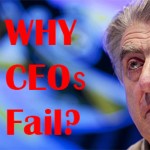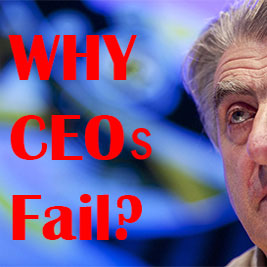Why Do CEOs Fail?
Boards trust their CEOs to be honest, open, transparent, and reliable. Many boards lean on their CEOs for advice. At times, a board can
- rely too heavily and fail to see the risks associated with the CEO’s recommendations
- become too friendly and fail to complete the oversight functions associated with governance
- believe in the CEO and fail to be strategic, or
- make decisions which favor the CEO and do not protect the well-being of the organization until it is faced with a crisis.
What do the experts say
 According to an article in Chief Executive, August 29 2012, experts say leadership failure has many signs but they have narrowed the cause to a few that stand out.
According to an article in Chief Executive, August 29 2012, experts say leadership failure has many signs but they have narrowed the cause to a few that stand out.
Claudio Fernando-Araoz, head of research for the executive recruitment firm Egon Zehnder International, found a pattern. CEOs who failed were hired on the basis of their drive, IQ, and business expertise – but fired for lack of emotional intelligence. They simply could not win over, or sometimes even just get along with, their board of directors, or their direct reports, or others on whom their own success depended.”
In the August 30, 2011 version of Psychology Today, Ronald Riggio writes about the Four Reasons Why Your Boss Is So Clueless . He contends that the boss is clueless because she doesn’t seem to know what’s REALLY going on in the workplace. This appears to be because she
- isolates herself from the organization and does not attend to important dynamics.
- is unable to tell the difference between good and poor workers
- does not monitor success
- ignores performance data
- is the wrong person for the job
- is unable to enforce the right decisions because the system will not support her endeavors.
In their book, “Why CEOs Fail: The 11 Behaviors That Can Derail Your Climb To The Top And How To Manage Them,” David Dotlich and Peter Cairo write one chapter on each of the 11 reasons why CEOs fail. These include:
- Arrogance— thinking that you’re right, and everyone else is wrong.
- Melodrama— needing to be the center of attention.
- Volatility—subject to mood swings.
- Excessive Caution— being afraid to make decisions.
- Habitual Distrust—focusing on the negatives.
- Aloofness — remaining disengaged and disconnected.
- Mischievousness—believing that rules are made to be broken.
- Eccentricity—trying to be different just for the sake of it.
- Passive Resistance— refraining from stating true beliefs.
- Perfectionism—getting the little things right and the big things wrong.
- Eagerness to Please— trying to win the popularity contest.
They also include a final chapter on why CEOs succeed.
In a Jul 21, 2010 article, Why CEOs fail, and what to do about it, Ray Williams states that research shows when someone assumes a new leadership role they have a 40% chance of demonstrating disappointing performance. Furthermore, 82% of newly appointed leaders derail because they fail to build partnerships with subordinates and peers. It appears the major reason for failure has nothing to do with competence, or knowledge, or experience, but rather with hubris and ego and a leadership style out of touch with modern times.
Sydney Finkelstein, author of Why Smart Executives Fail, researching several spectacular failures during a six year period concluded that these CEOs had seven similar harmful habits. They
- see themselves and their companies as dominating their environment.
- identify too closely with the company, losing the boundary between personal and corporate interests.
- think they are the only ones that have all the right answers.
- ruthlessly eliminate anyone who isn’t completely supportive.
- are obsessed with photos, speeches, appearances and publications in which they represent the company.
- underestimate obstacles.
- stubbornly rely on past achievements and successes.
 It appears that the habits and emotional IQ of under performing CEOs are crucial to his success. This information is very helpful for boards when looking to replace their CEO. It can assist boards to
It appears that the habits and emotional IQ of under performing CEOs are crucial to his success. This information is very helpful for boards when looking to replace their CEO. It can assist boards to
- formulate questions to ask referees which will elicit vital information to ensure the candidates
- focus on the vision and mission of the entity and use them as a backdrop for all of their communications and their work.
- have mechanisms to meet with clients/users/customers/patients and can articulate their needs and wants.
- know the details of what is happening in the organization but they do not engage in micromanagement
- look for and hire the best individuals to work on the management teams, focus on issues and refrain from blaming individuals, and support decisions made by the responsible manager, and
- understand the implications of current research and the present-day trends;
- formulate questions to ask potential candidates;
- evaluate a new CEO quickly to determine if it has made the right choice, avoiding longitudinal damage within the organization and to the entity’s reputation.
As Roger Goetze explains in his book, The Art of Reading People, it is essential for the chief employee of any entity to know how to read people’s bodies and body language to sum up their main traits almost instantly. They need to be able to assess mood changes, decision making and even changes of thought. The final key is that they need to understanding how people tick to build successful business or personal relationship with them.

